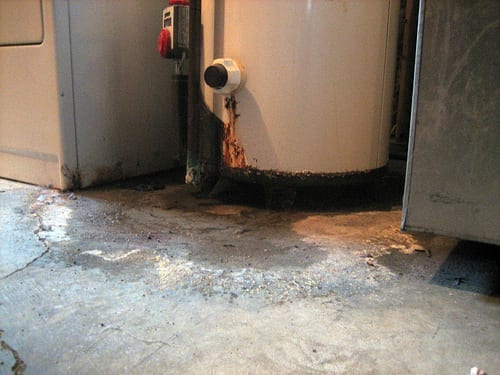The article listed below on the subject of How to Troubleshoot and Repair an Electric Water Heater is especially entertaining. Don't overlook it.

Lots of modern-day homes use an electric water heater for their furnace, because of its convenience and simplicity of use. Nonetheless, much like any other electric appliances, issues may occur with its use, suddenly. It can be actually aggravating to awaken to a cold shower instead of a warm one or having your bathroom with water that isn't hot adequate or even as well warm. Whatever the situation might be, water heater troubles can be quite stressful. Luckily, we have actually made a listing of possible remedies to your water heater problems. There are a variety of factors that might create a lot of these issues, maybe a concern with the power supply, the electric burner, or the thermostat. Before doing anything, ensure you switch off the major power supply for safety. Whatever the problem is, getting it repaired must not posture too much of a problem if you comply with these actions:
Check Your Power Supply:
As basic as this might appear, it is really necessary. Without sufficient power, your hot water heater will certainly not function. So the first thing to do when your water all of a sudden stops working is to verify that it isn't a power trouble. Inspect if the fuse is burnt out or the breaker tripped. If the circuit breaker is the problem, just turn it off and on once again. Change any kind of busted or damaged fuse. Test the device with power after these adjustments to see if it's currently working.
Check the Heating Element in the Water Heater:
If it's not a power trouble, after that try checking out your heating element if it is still working. Evaluate each of your burner to ensure the trouble isn't with any of them. If any of them is faulty, replace that part and then check whether the hot water is back on.
Check Your Thermostat:
If your water heater still isn't working or the water coming out isn't warm enough, you may need to inspect the temperature settings on your upper thermostat. Ensure the circuit breaker is switched off prior to doing anything. Open up the accessibility panel and also press the red button for temperature reset above the thermostat. This should help warm the water. Transform the breaker back on as well as inspect if the issue has been dealt with.
Call A Professional:
If after replacing all malfunctioning parts as well as resetting your temperature, the water heater still isn't functioning, you might need to get in touch with an expert plumber for a professional point of view. The trouble with your heating unit could be that the hot and cold faucets have been switched or it might be undersized for the quantity of hot water needed in your house. Whatever the situation may be, a specialist plumber would aid fix the problem.
Final thought
Hot water heater troubles are not always significant. Much of them are because of small problems like a blown fuse or worn-out burner. Replacing the damaged components should work. However, if you are still not able to solve the trouble, give a call to your closest plumber ahead to get it repaired.
Common Reasons Why Your Hot Water Heater Isn’t Working
Water Gets Too Hot
Ouch! You wanted a hot shower, not boiling! If you have a newer model electric water heater, your water heater works with a thermostat (actually, two thermostats). If this thermostat has been jostled — or purposely reset — by someone in your home, the water flow will be much hotter than you expected.
FIX: Adjust the thermostat to a more moderate setting for producing hot water. Forty-nine degrees Celsius is recommended to prevent scalding.
Water Doesn’t Get Hot
This is the opposite of the previous problem, but it’s almost as bad. Your flow of hot water is merely lukewarm or even incoming cold water. Once again, an incorrect thermostat setting, or a faulty thermocouple in a gas water heater, could be to blame. Another explanation might be that there’s no power to the water heater (in the case of an electric heater) or the pilot light has gone out (if you have a gas unit).
FIX: Adjust your thermostat as necessary. If that doesn’t do the trick, check the power supply. Another possibility is the replacement of a damaged thermocouple in gas water heaters.
Leaking Water Heater
A leaking water heater (a sign may be low hot water pressure, or not enough hot water to shower) might be a reason to push the panic button… but first, take a few minutes to check where the leakage is coming from. Leaks near the top of the heater tend to indicate a problem with a valve, which won’t need a major repair. However, a leak from the water heater base is more serious.
FIX: You may need a qualified plumber to replace your drain valve or TPR (temperature pressure relief) valve. When your water heater is leaking from below, your plumber might be able to fix it if you call them soon enough. Otherwise, you will need to have a new water heater installed.
Noisy Water Heater
Sometimes your water heater might make some peculiar noises, loud enough to compete with your singing in the shower. Are these a cause for alarm? It depends on exactly what kind of sounds you are hearing. Sizzles and rumbles are both red flags, indicating a heavy sediment buildup in your hot water tank that might cause a breakdown in the near future. In addition, banging is a sign of a water hammer, which can lead to serious damage to your pipes.
FIX: To stop sizzling or rumbling, turn off the tank and have it flushed by a reliable plumbing company ASAP. Ask your plumber to install a water hammer arrestor to quiet down the banging and save the pipes.
Pilot Light Keeps Going Out
Many pilot lights go out once in a while, but when your water heater pilot light keeps going out continually, it’s a problem. And the chances are good that that problem stems from either a shortage of combustible air or a malfunctioning thermocouple.
FIX: Increase the air supply around your water heater by cleaning dust and lint off the appliance and clearing any clutter from the area around it. A bad thermocouple will require expert plumbing repair and is more than basic gas water heater troubleshooting.
Water Smells Bad
The water from your residential plumbing pipes should smell neutral. If it has a strong unpleasant odour, something’s wrong. To check whether your water heater is at fault, turn on a hot water faucet and let it run for a few minutes. And, yes, use your nose to determine exactly what you are smelling.
FIX: For a garlicky odour, relight the pilot light on your water tank. When you detect the scent of garbage, you’ll need a professional plumber to flush the hot water tank and possibly replace the anode rod. A strong smell of rotten eggs could signal a hazardous gas leak; turn off the gas supply if possible, get everyone out of your house, and make an emergency call to the gas company.
Water Looks Brown Or Rusted
The first thing to do is ask yourself, “Is the brown, rusty-looking water coming only from my hot water taps?” If the answer is yes, then most likely, either the anode rod or the water heater interior is starting to rust, especially if your hot water heater is nearing the end of its life expectancy. (A “no” answer means the issue does not originate from the hot water heater but rather from the water supply.)
FIX: Contact a plumber to inspect the water heater. If you catch the problem quickly enough, it might be fixable. Otherwise, you’ll need a water heater replacement. Consider installation of an efficient new tankless water heater.
https://www.huskyair.com/blog/hot-water-heater-isnt-working/

As a passionate reader on What Would Cause My Electric Water Heater to Stop Working?, I assumed sharing that excerpt was smart. Loved our write-up? Please share it. Help someone else find it. We enjoy reading our article about Hot Water Heater Repair.
Further Details